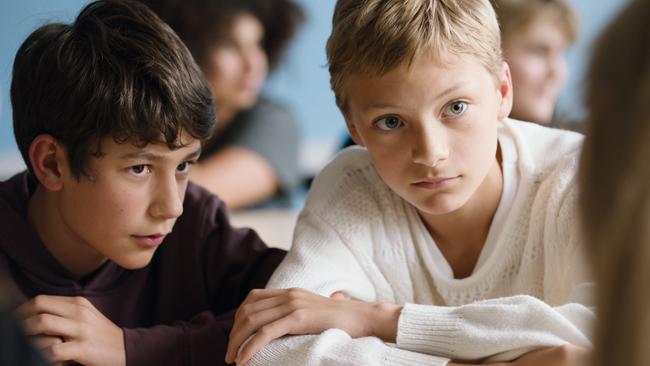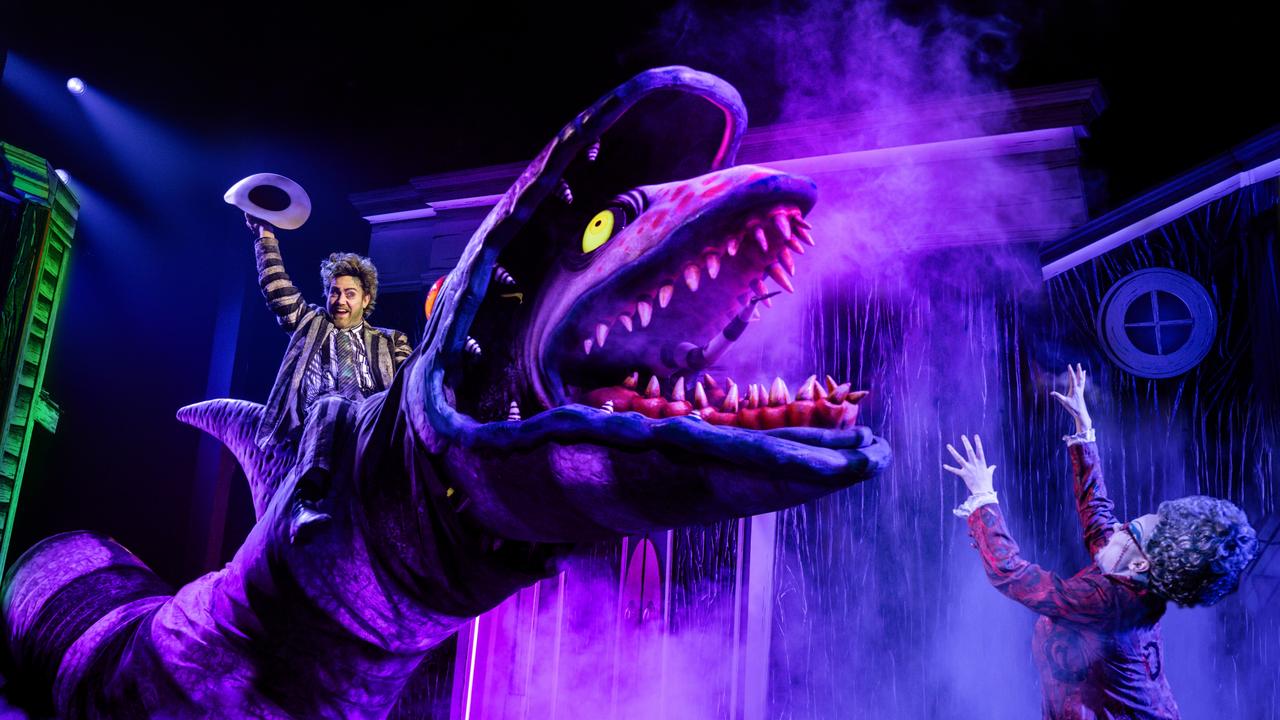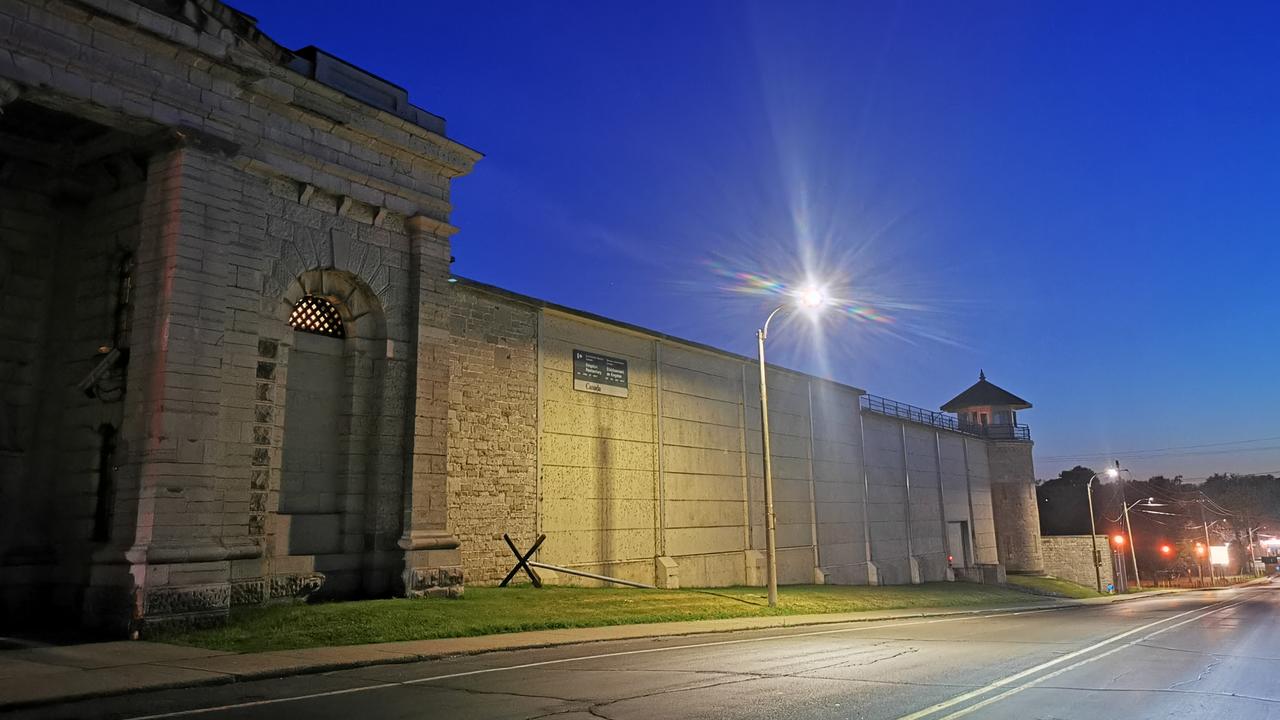Lukas Dhont’s Close, beautiful and moving tale of two friends
When two boys start high school a girl asks if they are “together”. Suddenly their innocent friendship is put to the test.

Close (M)
In cinemas from Thursday
★★★★
Close, which shared the Grand Prix in Cannes last year and is one of the five films nominated in the international category of the upcoming Oscars, is a Belgian-French co-production of considerable sensitivity.
Set in a rural part of Belgium over the course of a year, the film is about the friendship between two 13-year-old boys. Leo (Eden Dambrine) lives with his parents on their flower farm and, together with his older brother, helps out with the work. His best mate is Remi (Gustav de Waele), whose mother is a nurse. During the warm summer days the boys are inseparable. They hang out in an abandoned outbuilding, playing a game in which they pretend to be threatened by numerous enemies. They run through the fields, bicycle furiously along the lanes, and sleepover at one or the other’s house. The film captures beautifully the essence of pre-sexual friendship and the innocent delight these boys share in one another’s company.
Then it’s time to start high school. The boys show up on the first day together, stay close to one another as they encounter other kids they haven’t met before. The girls seem much more mature, more grown up than these country boys. And it’s a girl who, in the school canteen, poses the inevitable question, asking if Leo and Remi are “together”. This proves to be a watershed moment, especially for Leo who, apparently for the first time, is given an insight into how his relationship with Remi might look to others. He instinctively pulls back, protesting that he and his friend are just “close”.
From that moment on the friendship is put to the test. Leo distances himself from Remi, finds new friends, takes up ice hockey. Remi, perhaps less sensitive to the vibes being put out by the other kids, seemingly can’t understand the change in Leo. What has he done to alienate his friend? He becomes increasingly emotional and angry.
Just before the film’s midpoint something happens that changes everything. It’s a shattering development, best not revealed, though not revealing it makes writing about the film extremely difficult.
Close is the second feature made by Lukas Dhont, a gay director whose first film, Girl, won the Camera d’Or for Best First Feature at Cannes in 2018. That film centred on a teenage boy who wants to become a ballerina, and the film was greeted with both acclaim and, in the US, controversy. With Close this talented filmmaker also looks at the troubled world of young people and though the difficulties faced by Leo and Remi are very different from the problems that faced the protagonist in Girl there are certain similarities in the screenplay that the director wrote in collaboration with Angelo Tijssens.
There’s an excellent supporting cast: especially notable are Emilie Dequenne and Lea Drucker who play the mothers of the two boys. The former, especially, has some beautifully judged and deeply emotional scenes late in the film. But it’s the boys you’ll remember, especially Dambrine whose performance must rank as one of the best ever by a child actor. In his final scene, somewhat reminiscent of the unforgettable ending of Francois Truffaut’s first feature, Les quatre cents coups (The 400 Blows), 1959, Dambrine looks straight into the camera, making a direct connection with the viewer, until he turns his back. It’s a riveting conclusion to a beautiful and very moving film.
-
Corsage (M)
In cinemas
★★½
Should movies that purport to tell stories about real people offer an alternative reality to the actual facts? Quentin Tarantino, with Once Upon a Time … in Hollywood, did just that: (spoiler alert) he allowed Sharon Tate and her friends to survive at the end of the movie instead of being slaughtered by the Manson family. It was the happy ending we wish had happened in real life, but doesn’t it amount to fake news? These thoughts came to mind when watching the Austrian film, Corsage, in which the talented Vicky Krieps plays the 19th-century Duchess Elizabeth Amelie Eugenie, Empress of Austria and Queen of Hungary, who was popularly known as Sissi. In a film trilogy made in the mid-1950s, Romy Schneider became a popular star playing Sissi; those films – shot in colour, which was not usual for the time – were highly romantic, and were hugely successful in Europe, less so elsewhere.
Corsage unfolds between December 1877 and October 1878. Sissi, born in 1837 into the Wittelsbach family of Bavaria, had married Emperor Franz Joseph of Austria in 1854 when she was aged 16. When the film begins, she is turning 40 and is dissatisfied with almost everything about her privileged life, including her marriage (Florian Teichtmeister plays Franz Joseph as a singularly remote and unpleasant character). Director Marie Kreutzer appears to be drawing parallels with Princess Diana who was also trapped in a traditional world of royalty.
Hence, perhaps, the scenes of the Empress being imprisoned in her restrictive corset (“corsage”), a none-too-subtle analogy. Sissi worries about her weight, keeps to a strict diet, engages in gymnastics, fencing and horse riding, and travels extensively around Europe. She also uses heroin, which is prescribed by a doctor who assures her that it is harmless.
Kreutzer and Krieps – who initiated the film and is one of the executive producers – are not very interested in subtlety, or in the true story of Sissi, who was assassinated in 1898 by an Italian anarchist when she was visiting Geneva. Kreutzer polishes her off some 20 years earlier, and not by an assassin’s bullet.
The film, though handsomely mounted and persuasively acted, is infuriating for more than factual distortions. Anachronisms abound. Electric light fittings in the palace are just one intrusive deceit; even more annoying are the use of songs that were written many, many years later: why on Earth include Kris Kristofferson’s Help Me Make It Through the Night and The Rolling Stones’ As Tears Go By, both of which are sung by one of the Empress’s ladies in waiting. There’s also a very strange scene in which an inventor demonstrates to Sissi a camera that films moving pictures, and even films her prancing around. In 1878? Moving pictures weren’t invented for another 15 years at least.
Comparisons have been made with Sofia Coppola’s Marie Antoinette (2006), but that was, on the whole, more successful than Corsage. In forcing a contemporary spin on the story of the increasingly reclusive Sissi, Kreutzer somehow makes the character less, rather than more, interesting. That said, Krieps is very effective as the troubled protagonist and scenes with Franz Joseph and with her sister, Ida (Jeanne Werner), are well performed and stylishly handled.
Though many may well appreciate the film’s deliberate distortions and its rewriting of history, I found Corsage fascinating and irritating in more or less equal amounts.




To join the conversation, please log in. Don't have an account? Register
Join the conversation, you are commenting as Logout